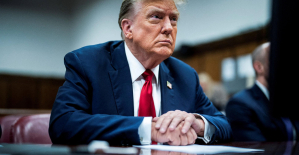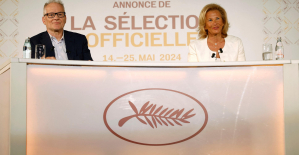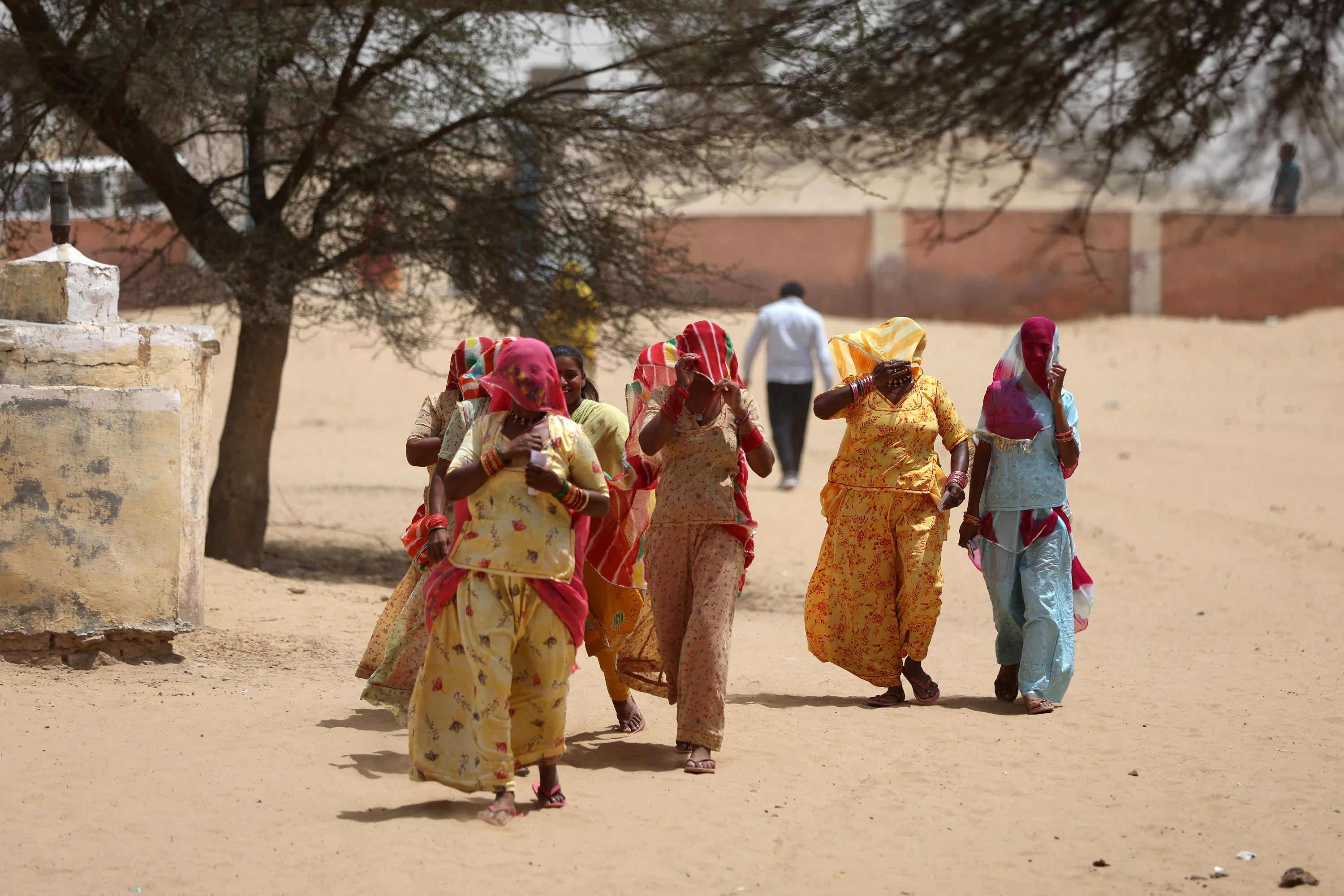At the beginning of a four-day visit to Iraq, Foreign Minister Annalena Baerbock announced further German support for the country. Iraq remains a "key factor for the stability of the region," said the Green politician in Baghdad on Tuesday.
She announced that Germany would continue to work towards a peaceful future for the country. "Because if new terrorism, Iranian influence or the destruction of livelihoods caused by the water crisis should lead to violence and political divisions here again, the consequences would also hit neighboring countries massively," she said.
Baerbock said that if Iraq succeeds in achieving stability and development in democracy and diversity over the long term, it could become a role model for the entire region. That is why Germany has supported Iraq since 2014 with over 3.4 billion euros in civilian funds alone.
Baerbock said that the Federal Republic of Germany is maintaining the pressure to pursue the terrorist militia Islamic State (IS) alongside Iraq and its international partners. "Because the world community did not prevent this genocide, we have all the more responsibility for investigating these crimes and for the survivors to experience justice."
Baerbock first met her counterpart Fuad Hussein in Baghdad. A meeting with Prime Minister Mohammed Shia al-Sudani was then planned. In the evening, the minister wanted to fly on to Erbil, the capital of the Kurdish autonomous regions in northern Iraq.
In order to get an idea of the German military commitment, she wants to meet soldiers of the Bundeswehr. In Erbil, the Bundeswehr is training Kurdish security forces in the fight against IS. The center of the German training mission is the multinational "Camp Stephan" run by the Bundeswehr.
The minister announced that she would also like to talk about Iran's problematic regional role and the Turkish and Iranian attacks on Iraqi territory in both Baghdad and Erbil. In addition, she will promote the joint fight against the consequences of the climate crisis, "so that the people in Mesopotamia can not only look back on a history that is thousands of years old, but can also look to the future with confidence".
US Secretary of Defense Lloyd Austin also paid a surprise visit to Baghdad on Tuesday and offered a continuation of military operations in the country. The US associations are "ready to stay" if there is an invitation to do so from the Iraqi government, Austin said. Since the end of the combat operation against IS, US military units have continued to be stationed in Iraq, where they are tasked with advising and training the Iraqi army.
During his visit, Austin described the US military presence as an "important mission". Its purpose is to "advise, support and enable" the Iraqi military in their "fight against terrorism". However, the US military must be able to "operate safely and securely to continue to do this essential work".
Upon his arrival, Austin said the purpose of his visit was to reaffirm the strategic partnership between the United States and Iraq. Iraq is on the way to becoming "more secure, more stable and more sovereign," the Pentagon chief wrote on Twitter.
Austin's visit comes days before the 20th anniversary of the US invasion of Iraq that toppled longtime ruler Saddam Hussein. On March 20, 2003, US troops launched their offensive in Iraq with the support of an international coalition. This began one of the bloodiest chapters in Iraqi history, marked by years of conflict and political instability.
More than ten years after its troop invasion, the United States supported Iraq at the head of an international military coalition in the fight against the IS militia when they occupied parts of northern and western Iraq in 2014. The extremists were driven out of territories it occupied in 2017 but continue to have sleeper cells in desert and mountain hideouts in both Iraq and neighboring Syria.
"Kick-off Politics" is WELT's daily news podcast. The most important topic analyzed by WELT editors and the dates of the day. Subscribe to the podcast on Spotify, Apple Podcasts, Amazon Music, among others, or directly via RSS feed.

 Germany: the trial of an AfD leader, accused of chanting a Nazi slogan, resumes this Tuesday
Germany: the trial of an AfD leader, accused of chanting a Nazi slogan, resumes this Tuesday New York: at Columbia University, the anti-Semitic drift of pro-Palestinian demonstrations
New York: at Columbia University, the anti-Semitic drift of pro-Palestinian demonstrations What is Akila, the mission in which the Charles de Gaulle is participating under NATO command?
What is Akila, the mission in which the Charles de Gaulle is participating under NATO command? Lawyer, banker, teacher: who are the 12 members of the jury in Donald Trump's trial?
Lawyer, banker, teacher: who are the 12 members of the jury in Donald Trump's trial? What High Blood Pressure Does to Your Body (And Why It Should Be Treated)
What High Blood Pressure Does to Your Body (And Why It Should Be Treated) Vaccination in France has progressed in 2023, rejoices Public Health France
Vaccination in France has progressed in 2023, rejoices Public Health France Food additives suspected of promoting cardiovascular diseases
Food additives suspected of promoting cardiovascular diseases “Even morphine doesn’t work”: Léane, 17, victim of the adverse effects of an antibiotic
“Even morphine doesn’t work”: Léane, 17, victim of the adverse effects of an antibiotic Orthodox bishop stabbed in Sydney: Elon Musk opposes Australian injunction to remove videos on X
Orthodox bishop stabbed in Sydney: Elon Musk opposes Australian injunction to remove videos on X One in three facial sunscreens does not protect enough, warns L'Ufc-Que Choisir
One in three facial sunscreens does not protect enough, warns L'Ufc-Que Choisir What will become of the 81 employees of Systovi, a French manufacturer of solar panels victim of “Chinese dumping”?
What will become of the 81 employees of Systovi, a French manufacturer of solar panels victim of “Chinese dumping”? “I could lose up to 5,000 euros per month”: influencers are alarmed by a possible ban on TikTok in the United States
“I could lose up to 5,000 euros per month”: influencers are alarmed by a possible ban on TikTok in the United States Dance, Audrey Hepburn’s secret dream
Dance, Audrey Hepburn’s secret dream The series adaptation of One Hundred Years of Solitude promises to be faithful to the novel by Gabriel Garcia Marquez
The series adaptation of One Hundred Years of Solitude promises to be faithful to the novel by Gabriel Garcia Marquez Racism in France: comedian Ahmed Sylla apologizes for “having minimized this problem”
Racism in France: comedian Ahmed Sylla apologizes for “having minimized this problem” Mohammad Rasoulof and Michel Hazanavicius in competition at the Cannes Film Festival
Mohammad Rasoulof and Michel Hazanavicius in competition at the Cannes Film Festival Skoda Kodiaq 2024: a 'beast' plug-in hybrid SUV
Skoda Kodiaq 2024: a 'beast' plug-in hybrid SUV Tesla launches a new Model Y with 600 km of autonomy at a "more accessible price"
Tesla launches a new Model Y with 600 km of autonomy at a "more accessible price" The 10 best-selling cars in March 2024 in Spain: sales fall due to Easter
The 10 best-selling cars in March 2024 in Spain: sales fall due to Easter A private jet company buys more than 100 flying cars
A private jet company buys more than 100 flying cars This is how housing prices have changed in Spain in the last decade
This is how housing prices have changed in Spain in the last decade The home mortgage firm drops 10% in January and interest soars to 3.46%
The home mortgage firm drops 10% in January and interest soars to 3.46% The jewel of the Rocío de Nagüeles urbanization: a dream villa in Marbella
The jewel of the Rocío de Nagüeles urbanization: a dream villa in Marbella Rental prices grow by 7.3% in February: where does it go up and where does it go down?
Rental prices grow by 7.3% in February: where does it go up and where does it go down? Europeans: “All those who claim that we don’t need Europe are liars”, criticizes Bayrou
Europeans: “All those who claim that we don’t need Europe are liars”, criticizes Bayrou With the promise of a “real burst of authority”, Gabriel Attal provokes the ire of the opposition
With the promise of a “real burst of authority”, Gabriel Attal provokes the ire of the opposition Europeans: the schedule of debates to follow between now and June 9
Europeans: the schedule of debates to follow between now and June 9 Europeans: “In France, there is a left and there is a right,” assures Bellamy
Europeans: “In France, there is a left and there is a right,” assures Bellamy These French cities that will boycott the World Cup in Qatar
These French cities that will boycott the World Cup in Qatar Serie A: Bologna surprises AS Rome in the race for the C1
Serie A: Bologna surprises AS Rome in the race for the C1 Serie A: Marcus Thuram king of Italy, end of the debate for the position of number 9 with the Blues?
Serie A: Marcus Thuram king of Italy, end of the debate for the position of number 9 with the Blues? Milan AC-Inter Milan: Thuram and Pavard impeccable, Hernandez helpless… The tops and flops of the derby
Milan AC-Inter Milan: Thuram and Pavard impeccable, Hernandez helpless… The tops and flops of the derby Ligue 2: Auxerre leader, Bordeaux in crisis, play-offs... 5 questions about an exciting end of the season
Ligue 2: Auxerre leader, Bordeaux in crisis, play-offs... 5 questions about an exciting end of the season


















